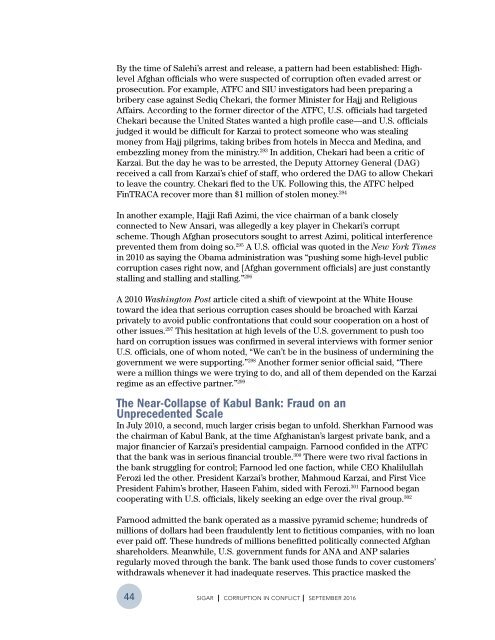CORRUPTION IN CONFLICT
5IlaWjQej
5IlaWjQej
Create successful ePaper yourself
Turn your PDF publications into a flip-book with our unique Google optimized e-Paper software.
By the time of Salehi’s arrest and release, a pattern had been established: Highlevel<br />
Afghan officials who were suspected of corruption often evaded arrest or<br />
prosecution. For example, ATFC and SIU investigators had been preparing a<br />
bribery case against Sediq Chekari, the former Minister for Hajj and Religious<br />
Affairs. According to the former director of the ATFC, U.S. officials had targeted<br />
Chekari because the United States wanted a high profile case—and U.S. officials<br />
judged it would be difficult for Karzai to protect someone who was stealing<br />
money from Hajj pilgrims, taking bribes from hotels in Mecca and Medina, and<br />
embezzling money from the ministry. 293 In addition, Chekari had been a critic of<br />
Karzai. But the day he was to be arrested, the Deputy Attorney General (DAG)<br />
received a call from Karzai’s chief of staff, who ordered the DAG to allow Chekari<br />
to leave the country. Chekari fled to the UK. Following this, the ATFC helped<br />
FinTRACA recover more than $1 million of stolen money. 294<br />
In another example, Hajji Rafi Azimi, the vice chairman of a bank closely<br />
connected to New Ansari, was allegedly a key player in Chekari’s corrupt<br />
scheme. Though Afghan prosecutors sought to arrest Azimi, political interference<br />
prevented them from doing so. 295 A U.S. official was quoted in the New York Times<br />
in 2010 as saying the Obama administration was “pushing some high-level public<br />
corruption cases right now, and [Afghan government officials] are just constantly<br />
stalling and stalling and stalling.” 296<br />
A 2010 Washington Post article cited a shift of viewpoint at the White House<br />
toward the idea that serious corruption cases should be broached with Karzai<br />
privately to avoid public confrontations that could sour cooperation on a host of<br />
other issues. 297 This hesitation at high levels of the U.S. government to push too<br />
hard on corruption issues was confirmed in several interviews with former senior<br />
U.S. officials, one of whom noted, “We can’t be in the business of undermining the<br />
government we were supporting.” 298 Another former senior official said, “There<br />
were a million things we were trying to do, and all of them depended on the Karzai<br />
regime as an effective partner.” 299<br />
The Near-Collapse of Kabul Bank: Fraud on an<br />
Unprecedented Scale<br />
In July 2010, a second, much larger crisis began to unfold. Sherkhan Farnood was<br />
the chairman of Kabul Bank, at the time Afghanistan’s largest private bank, and a<br />
major financier of Karzai’s presidential campaign. Farnood confided in the ATFC<br />
that the bank was in serious financial trouble. 300 There were two rival factions in<br />
the bank struggling for control; Farnood led one faction, while CEO Khalilullah<br />
Ferozi led the other. President Karzai’s brother, Mahmoud Karzai, and First Vice<br />
President Fahim’s brother, Haseen Fahim, sided with Ferozi. 301 Farnood began<br />
cooperating with U.S. officials, likely seeking an edge over the rival group. 302<br />
Farnood admitted the bank operated as a massive pyramid scheme; hundreds of<br />
millions of dollars had been fraudulently lent to fictitious companies, with no loan<br />
ever paid off. These hundreds of millions benefitted politically connected Afghan<br />
shareholders. Meanwhile, U.S. government funds for ANA and ANP salaries<br />
regularly moved through the bank. The bank used those funds to cover customers’<br />
withdrawals whenever it had inadequate reserves. This practice masked the<br />
44<br />
SIGAR I <strong>CORRUPTION</strong> <strong>IN</strong> <strong>CONFLICT</strong> I SEPTEMBER 2016


